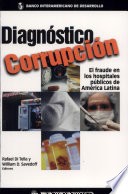Demanda inducida y ausentismo en los hospitales peruanos
Diagnóstico corrupción: el fraude en los hospitales públicos de América Latina
| Year | : | 2002 |
|---|---|---|
| Author/s | : | Lorena Alcazar, Raúl Andrade |
| Area/s | : | State reform and public institutions, Health and nutrition |
Alcázar, L., y Andrade, R. (2002). Demanda inducida y ausentismo en los hospitales peruanos. En R. Di Tella y W.D. Savedoff (Eds.), Diagnóstico corrupción: el fraude en los hospitales públicos de América Latina (pp. 137-179). Washington, DC: BID.
This chapter analyzes the relationship between institutional arrangements, incentives, and corruption in four Peruvian hospitals. It focuses on two particular types of corrupt practice: absenteeism by doctors and provision of unnecessary services (i.e., induced demand). One of the hospitals was operated in the private sector. Of the three public-sector hospitals, two were under the aegis of the Health Ministry (MINSA), and operated with different degrees of autonomy, and one was operated by the social security institute (ESSALUD). Absenteeism was analyzed using data from surveys of doctors and nurses. The survey analysis indicates that the different incentives faced by doctors, depending on their employment status, are significant factors in explaining high rates of absenteeism. Induced demand was analyzed with data on registered births at each of three hospitals to see whether unnecessary Cesarean sections were carried out. After controlling for medically relevant variables such as the mother’s health, gestational age, and birthweight, the private-sector and social-security hospitals had significantly higher Cesarean rates. Furthermore the doctor’s employment status and ability to schedule deliveries (whether or not delivery was on a weekend or holiday) were strongly associated with the likelihood of Cesarean delivery. Finally these analyses —and survey evidence on perceptions of corruption, transparency, mechanisms of control, and likelihood of punishment— are used to examine the implications for policies to reduce corruption and improve hospital performance.







